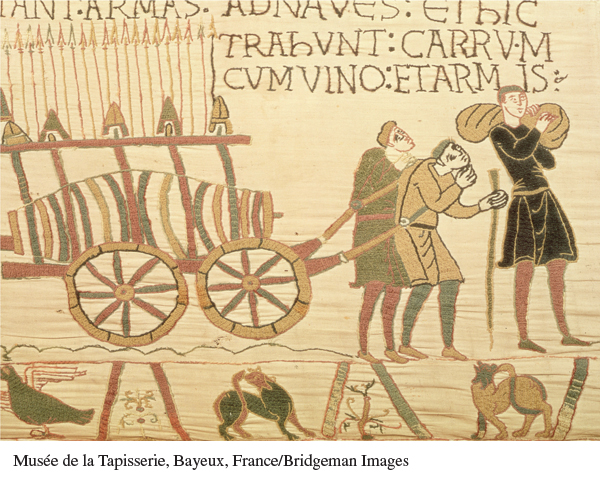A History of Western Society: Printed Page 250
A History of Western Society, Value Edition: Printed Page 237
A History of Western Society, Concise Edition: Printed Page 251
Introduction for Chapter 9
9
State and Church in the High Middle Ages
1000–1300
The concept of the state had been one of Rome’s great legacies to Western civilization, but for almost five hundred years after the disintegration of the Roman Empire in the West, the state did not exist. Political authority was decentralized, with power spread among many lords, bishops, abbots, and other types of local rulers. The deeply fragmented political units that covered the early medieval European continent did not have the characteristics or provide the services of a modern state.
Beginning in the last half of the tenth century, the invasions and migrations that had contributed to European fragmentation gradually ended, and domestic disorder slowly subsided. Rulers began to develop new institutions of law and government that enabled them to assert their power over lesser lords and the general population. Although nobles remained the dominant class, centralized states slowly crystallized, first in western Europe, and then in eastern and northern Europe. At the same time, energetic popes built their power within the Western Christian Church and tried to assert their superiority over kings and emperors. Monks, nuns, and friars played significant roles in medieval society, both as individuals and as members of institutions. A papal call to retake the holy city of Jerusalem led to nearly two centuries of warfare between Christians and Muslims. Christian warriors, clergy, and settlers moved out from western and central Europe in all directions, so that through conquest and colonization border regions were gradually incorporated into a more uniform Christian realm.▪

CHAPTER PREVIEW
How did monarchs try to centralize political power?
How did the administration of law evolve in this period?
What were the roles of nobles, and how did they train for these?
How did the papacy reform the church, and what were the reactions to these efforts?
What roles did monks, nuns, and friars play in medieval society?
What were the causes, course, and consequences of both the Crusades and the broader expansion of Christianity?
Chronology
| 936–973 | Reign of Otto I in Germany; facilitates spread of Christianity in the Baltics and eastern Europe |
| 1059 | Lateran Council restricts election of the pope to the college of cardinals |
| 1061–1091 | Normans defeat Muslims and Byzantines in Sicily |
| 1066 | Norman conquest of England |
| 1073–1085 | Pontificate of Pope Gregory VII, proponent of Gregorian reforms |
| 1095–1291 | Crusades |
| 1098 | Cistercian order established |
| 1100–1135 | Reign of Henry I of England; establishment of the Exchequer, England’s bureau of finance |
| 1100–1200 | Establishment of canon law |
| 1154–1189 | Reign of Henry II of England; revision of legal procedure; beginnings of common law |
| 1170 | Thomas Becket assassinated in England |
| 1180–1223 | Reign of Philip II (Philip Augustus) in France; territory of France greatly expanded |
| 1198–1216 | Innocent III; height of the medieval papacy |
| 1215 | Magna Carta |
| 1216 | Papal recognition of Dominican order |
| 1221 | Papal recognition of Franciscan order |
| 1290 | Jews expelled from England |
| 1298 | Pope Boniface VIII orders all nuns to be cloistered |
| 1302 | Pope Boniface VIII declares all Christians subject to the pope in Unam Sanctam |
| 1306 | Jews expelled from France |
| 1397 | Queen Margrete establishes Union of Kalmar |